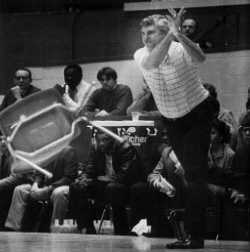
by Dr. Adam Naylor, CC-AASP
Self-control on the playing field is over-rated… or at least active efforts towards it. There is no doubt that unchecked anger and drifting attention are detriments to performance. Yet, how to achieve positive emotions and a resilient focus needs to be considered. In many regards keeping one’s cool when referees make undesirable calls and maintaining concentration in the face of particularly pesky opponents happens well before the ball is officially put in play.
In essence the most impressive displays of mental toughness occur rather effortlessly… or to be more precise, they are displays of automatic self-control. This is not to say that in-game cue words, mental imagery, or diaphragmatic breathing are not helpful, but they simply too often lack the robust benefits that effortless self-control mechanisms deliver. Active efforts to control one’s self reduce the ability to successfully control one’s self in the future. Plainly put, each time a conscious effort is made to regulate emotions there is a cost to future cognitive abilities… attention is a bit more likely to wander… frustration creeps in more easily…. decision making becomes a bit less precise. Just like physical muscles, mental muscles fatigue.
This is not an invitation towards wanton disregard for self-control, but rather a consideration of the benefits of priming performances in advance. It ought to come of little surprise that the environments in which one trains and competes have incredibly formative roles in an athlete’s development. It is clear how technical proficiency improves under the tutelage of a coach’s keen eye. It is also apparent how shared goals and aspirations of teammates can unify and rally a team. Now becoming more clear is how social environments can lead to successful management of emotions and attitudes.
Subtle cues and modeled behaviors can develop emotionally resilient competitors. Without words, social norms quietly teach individuals how to regulate feelings such as anger. Consider this on and around the playing field. Coaches that model a stiff upper lip when disappointed will find players who follow this focused lead. Conversely, sports parents that are quick to blame coaches for their child’s modest playing time are likely to develop athletes that are quick to play victim in the face of challenge. Sports culture of coaches and teammates that gravitate towards calm in the face of challenge reinforces these behaviors. The mental game is contagious… sport communities can spread strength or instability.
Recent research has gone as far as to highlight that the specific words that are heard and read literally are able to prime emotional performances. Kevin Rounding and his colleagues found that when sacred words (“Bible, “divine,” etc.) were subtly layered into sentence unscrambling tasks research participants had deep wells of self-control following their reading. Religion aside, Iris Mauss and her colleagues found that people’s anger could be automatically controlled when primed with words such as “cool,” “restrains,” and “disciplined.” In a somewhat cunning manner, such studies suggest that thoughtful and consistent use of particular language by coaches and sports organizations can reap great mental toughness benefits. This is far different than a passionate lecture about the importance of controlling one’s emotions. Quite literally the coach that embeds specific words of self-control into pre-game speeches could potentially see fewer penalties and greater resilience from his team on the field.
The sporting landscape is filled with examples of poor emotional regulation – from Bobby Knight’s chair throwing incident to parent misbehavior at youth baseball games to hockey violence committed out of frustration. Close inspection also reveals that too often the words of competition can be filled with themes of unrestrained aggression – one can only imagine the language, layered throughout the locker rooms involved in NFL bounty-gate. Aggressive play is important, but competing with unrestrained emotion leads to more failures than successes. I am a strong advocate of priming performance, sporting environments that give themselves regular doses of emotional regulating cues find focus and well directed energy on the field.
Originally published at Psychology Today’s The Sporting Life November 2012.
Register for the 2013 BSMPG Summer Seminar May 17 & 18th, 2013 in Boston MA



